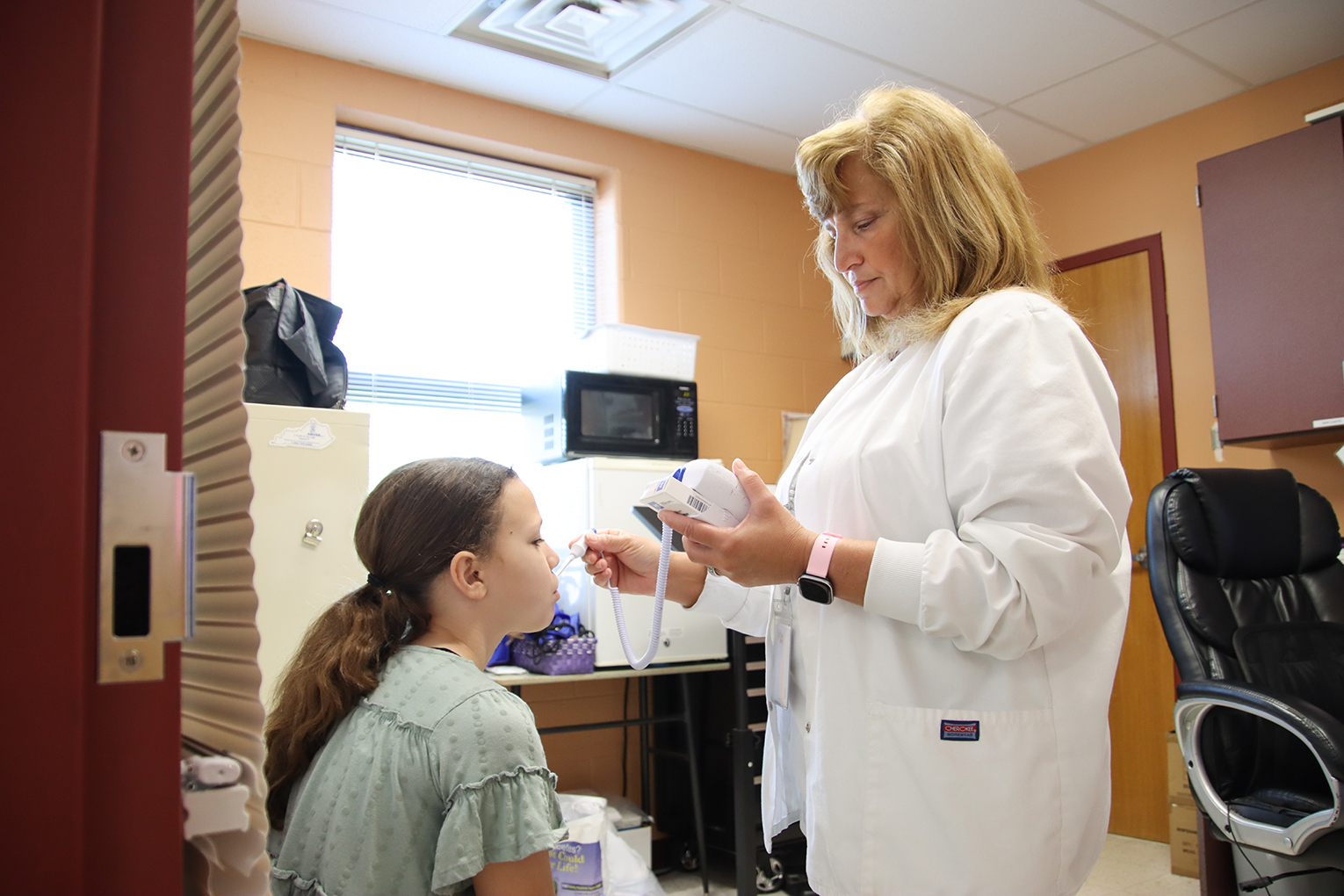
Nicole Villescas helps Tye Failauqa write a story about a time he was on a rollercoaster during Camp Literacy Live at La Grange Elementary School (Oldham County).
Photo by Amy Wallot, July 20, 2015
By Brenna R. Kelly
Brenna.kelly@education.ky.gov
In Cabin 4 at La Grange Elementary, teacher Abigail Bemiss asked three students gathered around her to spell “rainbow.”
“Chunk it out,” Bemiss said as she prompted the students to break the word into “rain” and “bow.”
“We pull out the chunks of the sounds so that they can break down the word,” Bemiss said as the students scribbled their best guesses onto white boards. “That way it’s not so intimidating.”
For the 42 incoming 1st -graders who attended Camp Literacy Live this July, reading and writing will be much less intimidating when they return to school later this month. The camp, now in its second year, provides intensive literacy instruction for students selected from three of Oldham County’s nine elementary schools.
“Our goal was to prevent the summer slide,” said Nicole Robison, the camp’s instructional coordinator. “But what we found after our first year was that we not only prevented the summer slide, but we also saw a lot of growth, especially in the area of writing.”
The district started the program in 2014 after the results of the kindergarten entry screener showed some students coming into the district weren’t prepared for kindergarten.
Although the district’s overall readiness rate was 70.9 percent in the 2013-14 school year, the percentage of kindergarten-ready students at two elementary schools was much lower — just 45.5 percent at La Grange and 48.9 percent at Centerfield. Those two schools were chosen for the camp and Locust Grove Elementary — which had a much higher readiness rate at68.1 percent — was added because of its proximity to La Grange.
The results of the 2014-15 school year showed an even greater need for the camp at La Grange. Just 31.9 percent of students at the school were ready for kindergarten when the school year began.
Teachers at the three schools select students based on assessment data and observation. About 60 percent of the students at this year’s camp came from LaGrange Elementary, the other 40 percent from Centerfield and Locust Grove.
The district provides transportation and students receive free meals through the federal summer meals program. The $70,000 cost of the four-week camp is funded entirely by grants.
In the classrooms, or cabins as they were called, students rotated through three stations–guided reading, interactive writing and an independent time – where students worked on their own or used an iPad to play phonics or sight word games.
At the teacher-lead stations, students worked in groups of three or four with one teacher, Robison said.
“The low student-to-teacher ratio really impacts the performance, as does the high quality of our teachers and staff,” she said.
Twelve campers received even more specialized instruction. Students were given an assessment at the beginning of camp which identified those who would work with a Reading Recovery specialist. They received 30 minutes of one-on-one instruction each day.
The Reading Recovery instruction was tailored to the students’ needs based on the results of the pre-assessment, said Joni Griffin, a Reading Recovery specialist.
“A lot of the kids at the beginning of the summer would just look at the pictures and make up the story, now we’ve gotten them to pay attention to the words and what they are reading,” she said.
Some of those students will continue in Reading Recovery when the school year begins, but some may test out of the intervention after camp, Robison said.
While working at guided reading station, 6-year-old Abigail Coffey stumbled over a word.
“Skip it,” said teacher Anne Cochran, “say ‘because blank are…’”
On her next try, Abigail got it.
“Because they are too big and very soft,” she read.
To help sound out the words, Abigail and other students used an alphabet chart with letters and pictures of an object that starts with the letter. When trying to write a word, the students wrote the letters inside boxes they drew.
“You put boxes so you can hear each letter sound,” Abigail explained.
Her teacher was more than happy with Abigail’s progress at the camp.
“To see the growth in just three weeks, it’s just amazing,” said Cochran, a literacy coach at Kenwood Station Elementary.
In addition to reading and writing, teachers worked with students on oral language development and vocabulary, Robison said.
“We utilize every minute, the transition time and meal times,” Robison said. “All of the teachers are down there at breakfast and lunch conversing with the students. Every minute counts.”
After a morning of reading and writing, the students spent the afternoon in a science camp brought to Oldham County by the Kentucky Science Center in Louisville.
“We worked very closely with them,” Robison said. “We reinforce what they are doing in the science camp, we pre-teach some of the vocabulary words that they are going to be learning in the afternoon.”
Robison also worked with the science center to align the science camp curriculum to Oldham County’s first grade science instruction.
“We’re basically pre-teaching the science curriculum in the summer so they will be better prepared when they get to first grade,” she said.
While students make a lot of progress working with the camp’s teachers, the students’ families also play a big role, Robison said.
“Part of the improvement we see in our children comes from the family component,” she said.
Before the end of school, camp staff held a kick-off night for families so parents could learn how to reinforce at home what the students were learning at camp.
“We laid out our promise to families and asked them to partner with us,” Robison said.
The staff gave families books to read with their children and questions to ask their children while reading together. During the four weeks, teachers contacts parents of campers at least once a week by phone or email.
“We talk to them about the improvements we are seeing in their child and ask if they have any questions,” she said. “It’s just another avenue for teachers to help support parents’ involvement.”
The last day of camp families came for lunch and a closing celebration before going to their child’s cabin where the student received awards and backpacks filled with school supplies.
And of course, there was also a parent workshop with tips on how to keep their children reading and writing.
“So we can keep the momentum going for the last couple weeks before school starts,” Robison said.
MORE INFO….
Nicole Robison, Nicole.Robison@oldham.kyschools.us




Leave A Comment